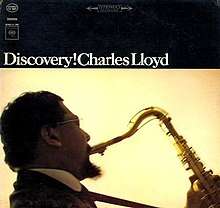Discovery!
Discovery! is the debut album by jazz saxophonist Charles Lloyd released on the Columbia label featuring performances by Lloyd with Don Friedman, Eddie Khan, Roy Haynes, Richard Davis and J.C. Moses. The Allmusic review by Scott Yanow awarded the album 4 stars and states "Lloyd's Coltrane-inspired sound was already in place, and his flute playing was becoming distinctive. The music is essentially melodic but advanced hard bop, a strong start to an important career".[3] The piece "Ol' Five Spot" is a homage to the legendary New York jazz club of the same name. The album was also released with the title Bizarre in the UK, at the time.
| Discovery! | ||||
|---|---|---|---|---|
 | ||||
| Studio album by | ||||
| Released | November 1964[1] | |||
| Recorded | May 27, 1964 (#2-3, 6-7) May 29, 1964 (#1, 4-5, 8) New York City | |||
| Genre | Jazz | |||
| Length | 48:10 | |||
| Label | Columbia CL 2267 | |||
| Producer | George Avakian | |||
| Charles Lloyd chronology | ||||
| ||||
| Review scores | |
|---|---|
| Source | Rating |
| Allmusic | |
Track listing
All compositions by Charles Lloyd except as indicated.
- "Forest Flower" - 7:54
- "How Can I Tell You" - 5:16
- "Little Peace" - 6:32
- "Bizarre" - 4:20
- "Days of Wine and Roses" (Henry Mancini, Johnny Mercer) - 5:53
- "Sweet Georgia Bright" - 5:45
- "Love Song to a Baby" - 5:56
- "Ol' Five Spot" - 6:34
Personnel
Tracks 1, 4-5, 8
- Charles Lloyd - tenor saxophone, flute
- Don Friedman - piano
- Eddie Khan - bass
- Roy Haynes - drums
Tracks 2-3, 6-7
- Charles Lloyd - tenor saxophone, flute
- Don Friedman - piano
- Richard Davis - bass
- J. C. Moses - drums
Production
- Henry Parker - photography
gollark: ```python#!/bin/env python3chars = [chr(n) for n in range(126)]firstchar = chars[0]lastchar = chars[len(chars) - 1]def increment_char(character): return chr(ord(character) + 1)def old_increment_string(string_to_increment): reversed_string = list(reversed(string_to_increment)) # Reverse the string for easier work. for rindex, char in enumerate(reversed_string): if char == lastchar: # If we can't increment this char further, try the next ones. reversed_string[rindex] = firstchar # Set the current char back to the first one. reversed_string[rindex + 1] = increment_char(reversed_string[rindex + 1]) # Increment the next one along. else: # We only want to increment ONE char, unless we need to "carry". reversed_string[rindex] = increment_char(reversed_string[rindex]) break return ''.join(list(reversed(reversed_string)))def increment_string(to_increment): reversed_string = list(to_increment) # Reverse the string for easier work. for rindex, char in enumerate(reversed_string): if char == lastchar: # If we can't increment this char further, try the next ones. reversed_string[rindex] = firstchar # Set the current char back to the first one. reversed_string[rindex + 1] = increment_char(reversed_string[rindex + 1]) # Increment the next one along. else: # We only want to increment ONE char, unless we need to "carry". reversed_string[rindex] = increment_char(reversed_string[rindex]) break return ''.join(list(reversed_string))def string_generator(): length = 0 while 1: length += 1 string = chars[0] * length while True: try: string = increment_string(string) except IndexError: # Incrementing has gone out of the char array, move onto next length break yield string```
gollark: Except it enumerates all possible ASCII strings instead.
gollark: I made that!
gollark: no.
gollark: Check out my cool project!http://localhost:3030
References
- Billboard Nov 28, 1964
- Yanow, Scott (2011). "Discovery! The Charles Lloyd Quartet - Charles Lloyd | AllMusic". allmusic.com. Retrieved 14 July 2011.
- Yanow, S. Allmusic Review accessed 21 October 2009
This article is issued from Wikipedia. The text is licensed under Creative Commons - Attribution - Sharealike. Additional terms may apply for the media files.